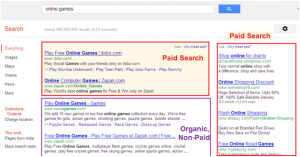What are different forms of website traffic | understanding different types of website traffic
If you have been monitoring your website for traffic and were not able to understand the uneven flow of visitors then this article is for you. I will now discuss with you how web traffic is categorized into different categories.
You can see there are 3 types of traffic showing, Search Traffic, Referral Traffic & Direct Traffic.
1. Referral Traffic:
Referral Traffic is what you are getting from sites having your links and how many people clicked on those links to reach your site.
If any user is coming to your website through any other websites like from the Blogs or Forum or Social Bookmarking or Articles or any Social Networking website like Facebook, Google+, Pinterest, YouTube etc. then traffic coming from those sources is called the referral traffic.
As social networks, are largest sources of referral traffic and now a days Pinterest is driving more referral traffic on the web than the combine traffic of Google+, YouTube, Reddit, and LinkedIn, Facebook, Twitter, etc.
2.Search Engine Traffic:
Usually whenever we have any query or something to search, we just type our query in any of search engine like Google, Yahoo, Bing, Ask etc. and get listing of web pages returned by a search engine in response to typed search query and such a traffic that we get from search engine results is called Search Engine Traffic.
So Search Engine traffic is what you get when user is coming on your website by searching on search engine and clicking on the links on a Search engine results page (SERP).
When you search anything through Search Engine, you are presented with a search engine results page (SERP) with two options: Organic Search results and Paid Search results.
Both comes under “Search Engine Traffic”.
Organic Search:
Organic Search also known as Natural Search or Non-Paid Search.
Organic Search means you get results from unpaid listings on search engines, those results pages appear based on content and keyword relevancy. This is in contrast to paid listings where rank is given based on who paid the most money to appear at the top on some sites.
Organic search results are not paid advertisements so when you do search engine optimization you are attempting to adjust the content of your Web pages to rank well in the organic search results.
Organic search may drive many times more traffic to your site than paid search and many people believe that organic results are more accurate, because they are generated by popularity and common usage.
Users can view only organic search results by preventing or blocking ads from being shown in search results and to block ads users can use browser add-ons and plugins, one of the most popular being AdBlock Plus (for Mozilla Firefox and Google Chrome).
One of the related term here is CTR stands for Click-Through Rate and, in the terms of organic search results, it refers to number of clicks on your site by search engine user whenever it gets displayed in the search results.
Simply being listed on the first page of Google do not generate Search engine traffic.
Paid Search:
Paid Search is also called Non-Organic or Sponsored search.
In this type of Search Web site owners pay an advertising fee usually based on click-through or ad views to have their Web site search results shown in top placement of the search engine results pages or as a separate ad: generally placed to the side of organic search results as you can see in above picture.
Some search engines makes it easy for users to determine which search results are Organic and which are Paid search results by displaying Paid Search Results with light yellow background.
Paid search traffic is gaining traffic by displaying ads on search engine results page. Most search ads are sold on a CPC (cost-per-click) / PPC (pay-per-click) basis. Some people also refer to paid search as SEM (search engine marketing).
3.Direct Traffic:
Direct Traffic is gained when people directly type your site’s name in URL box and gets your website.
Direct Traffic is not the traffic that came to your site by clicking a link from another website (like Twitter, Facebook, another blog, etc), it’s not the traffic that comes from your paid campaigns (like Google AdWords).
Direct traffic is gained when user arrives to your site by,
– Typing your URL into the browser’s address bar.
– Clicking on links in documents like Word, Excel, or PDF.
– Clicking on a bookmark.
– Clicking on a link in an email, SMS, or chat message.



